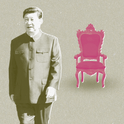Is there a lesson to be drawn from the Russian Revolution at its centenary? “Try again. Fail again. Fail better,” is the word from Marxist provocateur Slavoj Žižek, channelling “Lenin at his Beckettian best.” Author China Miéville is similarly downbeat, identifying the lesson as the recognition that “things changed once, and they might do so again.” Those are the friendly assessments from the left.
Move right, and it gets worse. Egregious failure is the general message—failure of the revolution, failure of the Soviet system, and, by extension, failure of socialism. “Our times are not especially friendly to the idea of revolution,” Steve Smith noted ruefully in a scholarly forum. “While our knowledge… has increased significantly… our ability to understand—certainly to empathise with—the aspirations of 1917 has diminished.” With the crimes of the Stalin era seen as the revolution’s appalling, inevitable outcome, its centenary is something to be “mourned, not celebrated,” wrote Max Hastings.
Western Russia-bashing usually provokes an angry and opposite response from the country. Not this time. Putin hasn’t gone so far as to call for mourning, but he is not celebrating either. He approves of Stalin the nation-builder; Lenin the nation-destroyer is another matter. The whole issue of the revolution is too divisive, his spokesman told the New York Times, when Russia needs reconciliation. So the government will not officially mark Red October, any more than it marked the first liberal revolution, of February 1917, earlier this year. To be sure, the now-marginal Communist Party of the Russian Federation promises “festive rallies,” complete with a Pokémon-type game called “Catch a counter-revolutionary.” But there is little to encourage would-be pilgrims to what was once the revolutionary mecca.
Dealing with the centenary in Russia is “awkward” and “not very comfortable,” Olga Fedianina wrote in the newspaper Kommersant, but at least “nothing stops one from organising a celebration in the world of great art.” This reaction is observable not only in Russia but also internationally: there are centenary exhibitions everywhere, generally concentrating on the constructivist avant-garde which claimed the revolution as its own. But even that turns out to be a minefield. Before the opening of the Royal Academy show, the Guardian’s art critic, Jonathan Jones, thundered that “we cannot celebrate revolutionary Russian art—it is brutal propaganda.” The Academy’s show turned out to be schizoid in its message: the paintings exuberantly celebrated a new world, while the text beside them insistently reminded viewers it would all end in tears. If anybody missed the point, a dark room at the end of the exhibit running mugshots of Gulag prisoners was there to reinforce it.
It’s odd to find that our collective assessment of the Revolution should now be more negative than it was during the Cold War, when many people condemned the revolution but few dismissed it as an inconsequential failure. It was not then completely taboo, as it seems to be now, to recall—in addition to Stalinist repression—the liberationist appeal in the Third World, its emancipatory legislation on women, or the Soviet modernisation of the 1930s which impressed economists as well as fellow-travellers. What is going on here? Others might “cash in on revolutionary chic,” Jones noted apropos of the Academy’s exhibition, but “Me, I will be remembering the kulaks.” Has sanctimoniousness become endemic in the world of Anglophone public intellectuals? Or is automatic condemnation of the revolution and all its works a product of the same mindset that equates Putin with Stalin, and treats Russia as public enemy No 1, as if the Cold War were still on and Russia still a superpower? (“If only,” Putin must be thinking.)
But no doubt there is also another logic underlying current attitudes to the Russian Revolution, namely the Soviet Union’s disintegration in 1991, which (for the time being) makes failure the all-purpose interpretative template. EH Carr was criticised for treating the winners of the Russian Revolution as more important than the losers. Now, those erstwhile winners have lost. So, following the treatment of losers Trotsky recommended, before he became one, they are being thrown onto the dustheap of history.

The erstwhile winners are being thrown onto the dustheap of history.
The Russian revolution's unhappy birthday
A centenary consensus dismisses the Soviet takeover as an unmitigated failure. That says more about us than the Bolsheviks
September 14, 2017











